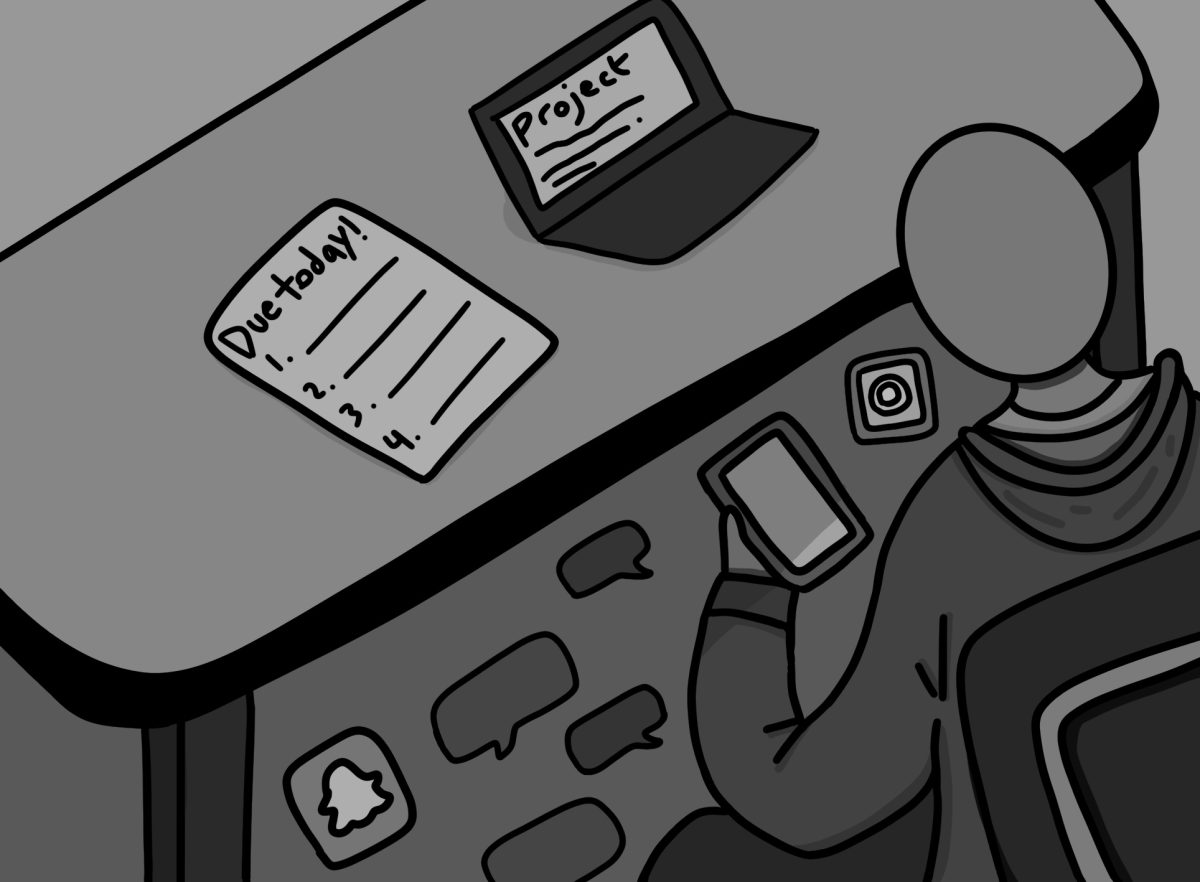Phones: they are one of the most prominent topics of debate for today’s generation. Do they have an overall positive or negative impact? What about social media and its effects on teens and their mental health? And what should be done about their presence in learning environments?
Shorewood is no stranger to this problem. In recent years, especially at the start of this school year, schools across the country have battled with their options. For example, middle schools Robert Eagle Staff and Hamilton International, in the Seattle School District, have started a total ban on phones. The phones go into locked pouches at the beginning of the day and can’t be taken out until the end. Do students and teachers think this should be the case at Shorewood as well, or should some other form of restrictions be implemented?
Currently, a phone ban like the ones at some Seattle schools is not in consideration at Shorewood. However, a few teachers here have decided to take matters into their own hands in terms of phone policies. Nathan Stearns, an English teacher here at Shorewood, is one of a handful of teachers who are using ‘phone walls’. “At the beginning of class, students put their phones in a series of pouches at the front of the room,” he explains.
It might come as a surprise, but he hasn’t experienced a lot of pushback for his decision to limit phones. “Mostly, [students] are resigned…they’re not angry about it, and they don’t try to convince me otherwise,” Stearns said. Based on Stearns’ experience, it appears that many students are okay with having their phones away from them, at least during class. Emma Lanser, a sophomore, agreed. “I think that if most students aren’t going to use their phones responsibly, then I think that it would be good to take away the temptation to cheat or be disrespectful by not paying attention. They’re missing out on their learning opportunities,” Lanser said.
But of course, this isn’t the case with all Shorewood students. There are always two sides to every argument, and this one is not exempt. “To me, [a phone ban] is so stupid, because it’s up to me if I use my phone or not. But obviously, if it’s disruptive in class, like watching Instagram Reels, then I agree with the teacher being able to take away your phone,” said Jessica Saleska, a sophomore. She also brought up a point that many students worry about when they aren’t able to access their phones, whether in a locked pouch or a phone wall. “What if there’s an emergency or early dismissals?”
Stearns has put some thought into this situation, and he argues that his phone wall shouldn’t have much of an effect on emergency reactions. “I feel pretty confident. They’re not, like, locked in some pouches. They’re right there when you need it. So, if, let’s say, there were to be a lockdown, it is easily accessible. It’s not accessible in the sense of one second, but it is within about 30 seconds,” he said. Sarah McFarlane, a history teacher, says that even with a total phone ban, students still can call parents in the case of an emergency or urgent matter. “If a kid really needs to call their house, they can use my [classroom] telephone. So we have a safety network in place,” she said.
McFarlane is adamant that phones must be restricted in schools. Her own phone wall, one of the first to go up in the last couple of years, is proof of this. “I’ve been teaching since 1987, and so …I’ve just observed a lot of changes in behavior and in mental health, and really for a lot of humans of all ages but particularly young people. And I’ve just been really concerned about that as I’ve watched it happen,” she said. “I would not be opposed to [a total ban] at Shorewood.”
Both McFarlane and Andrew Bagley, a science teacher, have been trying to orchestrate phone restrictions for years. “Mr. Bagley and I were trying to get stuff going on for this for the last several years, even before COVID too…He and I have talked about it and wanted to have school-wide discussions about phones and a school policy,” McFarlane said.
For many students, life without their phones is unimaginable. However, plenty of students lean towards favoring a ban. One student, a senior named Lyla Daisley, thinks a phone ban might have both negative and positive impacts. “I think a total phone ban would be harsh, but I could also see why it could be good,” Daisley said.
Trey Messner, a history and AP Psychology teacher at Shorewood, believes that there’s probably a better solution out there. “I think there is a use for phones, and I think a total ban is a bit much,” he said. Messner chooses not to use a phone wall, although he encourages phones to be put away during class. He reasons that “students need to learn to self-regulate. And I think there’s a lot of recognition [among students] … of this being a problem. The technology’s not going to go away, and in my opinion, it’s about learning how to properly deal with it as an individual”.
PROS & CONS
Pros:
-The implementation of phone policies has had several positive effects on the students, including a decrease in phone use during class time. “[They were] slowly pulling phones out and I would have to ask people to put them away,” Nathan Stearns, an English teacher, said. After having a phone policy, Stearns’ students no longer took out their phones during class time.
-Mental health must also be taken into consideration while talking about new phone policies. The National Library of Medicine shows that the overuse of phones can lead to depression, anxiety, and low self-esteem. There is no reason why these types of issues should be amplified in the classroom setting.
-Having strict phone policies allows students to be their best during school, resulting in higher grades and greater academic progress. “[Phones] make me procrastinate,” sophomore Jessica Saleska said.
-Some would say there is now a lack of socialization at school, which might be remedied through the absence of phone usage. How many times have you walked into SAS and seen every single student with their faces glued to their devices? “I could also say as a veteran teacher, it used to be… people would play cards…they would play games or socialize,” said Trey Messner. “… now it’s a lot of [staring at phones]”. SAS can be a time to be productive, but it can also be a time for socializing with fellow classmates.
-“I’m not as likely to get ‘sucked in’ to social media,” says Emma Lanser, a sophomore who currently doesn’t own a phone. “Most of the time, I see students not being responsible [with their phones],”. Life without a phone has allowed Lanser to avoid social media, which has been proven to lead to addiction as well as create a negative body image according to the National Institute of Health.
Cons:
-Many worry about being unable to contact their parents during emergencies. Last year at Shorewood, there were multiple lockdowns where students’ phones would be a necessity.
-Having phones taken away can also lead to the absence of communication between friends and family. Without a phone, it is difficult for students to reach each other, even for academic purposes. “They would send out texts when I was in tech…I wouldn’t get [those texts] at school,” Lanser said.
-There are reasons to reach out to guardians as well; Perhaps something happened to a family member, or your parents want you to take the bus home today. This type of information is effortlessly received through texting and calling.
-In school, phones may be used for calculators or taking photos of useful information. “Sometimes you might have a friend tape you doing a speech…” Stearns says. “You could see how you’re doing. That’s super useful.” For others, it is an effective way to cool down after finishing lots of classwork. Phone policies can even limit students’ full academic potential because of the useful tools that could be in the palm of their hands. When technology is limited, students are restricted from resources they could have access to.
Sammy Says: “Do you think phones should be allowed in the classroom?”

Conner Lemker, 11
“Yes. I think that phones should be allowed in classrooms as long as the kids aren’t being distracted by them and are doing all their work. If the teacher gives you time, you should be allowed to.”
Lyla Daisley, 12
“It’s kind of a weird problem, because… when you’re not really doing anything it can be nice to have your phone out, but if you’re in like math or english it can be a really big distraction. So it depends. I had a teacher who had a phone wall and it was a nice touch.”
Matthew Alisch, 9
“It just depends on what the teacher wants. I feel like if the teacher’s talking maybe [it shouldn’t be out], but during silent work time it’s fine.”
Maya Gladhart, 10
“I feel like not necessarily in classrooms but just in schools in general. I don’t feel like they have to be in the classroom. I’ve seen a lot of teachers do the phone cubbies which I think are good. I’ve definitely seen a lot of people on their phones during class and I feel like it’s distracting.”










Ursula R Stickelmaier • Dec 16, 2024 at 1:53 pm
This was such an interesting spotlight to read! I loved all the different elements and you got some great quotes!